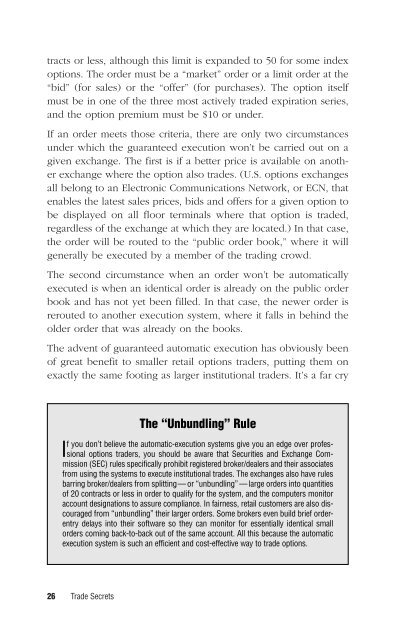7 Steps to Success Trading Options Online - Traders' Library
7 Steps to Success Trading Options Online - Traders' Library
7 Steps to Success Trading Options Online - Traders' Library
You also want an ePaper? Increase the reach of your titles
YUMPU automatically turns print PDFs into web optimized ePapers that Google loves.
tracts or less, although this limit is expanded <strong>to</strong> 50 for some indexoptions. The order must be a “market” order or a limit order at the“bid” (for sales) or the “offer” (for purchases). The option itselfmust be in one of the three most actively traded expiration series,and the option premium must be $10 or under.If an order meets those criteria, there are only two circumstancesunder which the guaranteed execution won’t be carried out on agiven exchange. The first is if a better price is available on anotherexchange where the option also trades. (U.S. options exchangesall belong <strong>to</strong> an Electronic Communications Network, or ECN, thatenables the latest sales prices, bids and offers for a given option <strong>to</strong>be displayed on all floor terminals where that option is traded,regardless of the exchange at which they are located.) In that case,the order will be routed <strong>to</strong> the “public order book,” where it willgenerally be executed by a member of the trading crowd.The second circumstance when an order won’t be au<strong>to</strong>maticallyexecuted is when an identical order is already on the public orderbook and has not yet been filled. In that case, the newer order isrerouted <strong>to</strong> another execution system, where it falls in behind theolder order that was already on the books.The advent of guaranteed au<strong>to</strong>matic execution has obviously beenof great benefit <strong>to</strong> smaller retail options traders, putting them onexactly the same footing as larger institutional traders. It’s a far cryThe “Unbundling” RuleIf you don’t believe the au<strong>to</strong>matic-execution systems give you an edge over professionaloptions traders, you should be aware that Securities and Exchange Commission(SEC) rules specifically prohibit registered broker/dealers and their associatesfrom using the systems <strong>to</strong> execute institutional trades. The exchanges also have rulesbarring broker/dealers from splitting— or “unbundling” — large orders in<strong>to</strong> quantitiesof 20 contracts or less in order <strong>to</strong> qualify for the system, and the computers moni<strong>to</strong>raccount designations <strong>to</strong> assure compliance. In fairness, retail cus<strong>to</strong>mers are also discouragedfrom “unbundling” their larger orders. Some brokers even build brief orderentrydelays in<strong>to</strong> their software so they can moni<strong>to</strong>r for essentially identical smallorders coming back-<strong>to</strong>-back out of the same account. All this because the au<strong>to</strong>maticexecution system is such an efficient and cost-effective way <strong>to</strong> trade options.26 Trade Secrets


